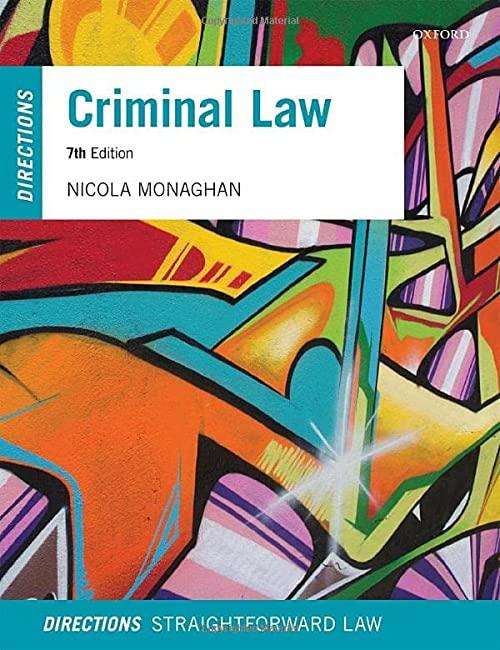Question
Stephen Henchman is a licensed financial adviser who works for a large financial planning and investment advice company called WIN Ltd. Two years ago he
Stephen Henchman is a licensed financial adviser who works for a large financial planning and investment advice company called WIN Ltd. Two years ago he advised Ray and Arlene Armstrong as to how they should invest their life savings. The Armstrongs explained to Mr Henchman that they had worked together for many years as cleaners in a large office building in the Perth CBD but that, as they were now both of retirement age, they were looking to put their feet up and 'enjoy life'. They indicated that they had approximately $500,000 available to invest and that they were looking for a safe and secure investment that would produce a steady income stream. Mrs Armstrong also mentioned that her brother and sister in law, Peter and Anne Orme, were in a similar position to the Armstrongs and that they too were planning to retire in the near future. She specifically told Henchman that, because her brother was very lazy, and not very clever, it was likely that whatever Henchman advised the Armstrongs to do with their 'retirement money', her brother and his wife would likewise do with theirs.
Henchman recommended that the Armstrongs invest the full amount of their savings in a complex, structured, synthetic investment product known as Williebrandt Notes. Henchman assured the Armstrongs that the Williebrandt Notes were an "extremely strong" product that could be relied on to deliver stable financial returns even in the most volatile market conditions. In saying this Henchman was relying, not on any independent research he himself had undertaken (for he had undertaken none), but rather on a "marketing script" written for him by his employer. The Armstrongs were very impressed with what Henchman told them. But still, they were in no rush to invest. They thought about it for a few days, talked it over with the Ormes and then, after nearly a week, they went back to see Henchman armed with two $500,000 cheques, one from themselves and one from the Ormes. They asked Henchman to use that money to purchase $1,000,000 worth of Williebrandt Notes in the name of the 'Orme and Armstrong Family Trust'.
Mr Henchman was only too pleased to do as they asked because, under the terms of his employment contract, he was entitled to be paid an enormous commission for having clinched such a 'high net value' sale. So the sale and purchase of the Williebrandt Notes was quickly arranged and settled (even though the written contract of sale that the Ormes and the Armstrongs signedid not contain an express promise guaranteeing the ability of the Notes to deliver 'stable financial returns') and, for the first twelve months or so, all went well. The Notes performed well and delivered excellent returns. However, over the last six months, things have taken a dramatic turn for the worse. Changed credit conditions have caused the Notes to suffer a catastrophic fall in value. As a result, the Ormes and the Armstrongs have lost almost all of their life savings and all four of them have been forced to give up their retirement plans and return to work.
Can the ormes and armstrongs be liable for contributory negligence?
what affect does the disclaimer have in this case?
On the basis of the above facts advise both the Ormes and the Armstrongs as to their legal rights against Mr Henchman under the law relating to tortious liability for negligent misstatements?
Step by Step Solution
There are 3 Steps involved in it
Step: 1

Get Instant Access to Expert-Tailored Solutions
See step-by-step solutions with expert insights and AI powered tools for academic success
Step: 2

Step: 3

Ace Your Homework with AI
Get the answers you need in no time with our AI-driven, step-by-step assistance
Get Started


